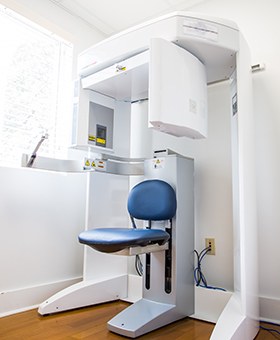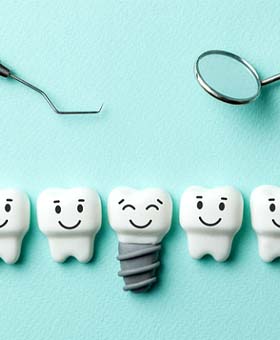Thanks to advances in dental technology over the past two decades, we’re now able to basically bring back any number of missing teeth in their entirety. Dental implants replace dental structure from root to crown, creating a state-of-the-art addition that is the next best thing to nature, helping patients enjoy renewed oral health and bolstered confidence at the same time. If you’re ready to permanently close the gaps in your smile, dental implants can help you do it, and you can get them right here at 333 Dental Care. To schedule an appointment and learn if you would be a good candidate for this treatment, contact us today.
Dental Implants – Mangum, OK
A New Kind of Tooth Replacement
Why Choose Us for Dental Implants?
- All-inclusive dental implant care under one roof
- Restorations personally designed for every patient
- 98% success rate
What are Dental Implants?

Dental implants are thin posts that are designed to support a dental restoration such as a crown, bridge, or denture. Each post is inserted into the jawbone at a carefully chosen angle. After forming a strong bond with the bone, the implant post will be ready to support your new smile, giving it chewing strength that’s almost on par with your natural teeth. Dental implants are unique compared to other tooth replacements since they can perform the same functions as your natural tooth roots.
The 4-Step Dental Implant Process

When you choose to get dental implants to restore your smile, you are committing to a process that typically takes months to complete. At our office, we perform each step of this process under one roof, including the surgical placement of the implant posts and the delivery of the final restoration; we’ll make sure that you fully understand what to expect at every stage and help you prepare accordingly. Here’s an outline of what the implant process typically looks like.
Initial Dental Implant Consultation

Dental implants can only be placed after we’ve confirmed that you’re a good candidate for the procedure. At your initial consultation, we’ll utilize the latest technology to examine your mouth and face. We’ll check to see if bone grafting, gum disease therapy, and other preliminary treatments might be necessary before you can have dental implants placed. After we’ve confirmed that dental implant surgery is a viable option for you, we can start planning the rest of the process.
Dental Implant Surgery

Other dental practices might have to refer you to a specialist for dental implant surgery, but we have the training and technology to complete the procedure in-office. The first step is to numb your mouth so that you don’t experience discomfort. Then, after opening your gums, we can insert the dental implant posts at precisely chosen locations in your jawbone. The gums are sutured shut afterward, and a protective cap is placed on each post to keep them safe during the healing process.
Dental Implant Osseointegration & Abutment

It will take about three to six months for the dental implants to fuse with the jawbone. This natural process is called osseointegration, and it’s an extremely important step. If the implant posts aren’t able to form a strong bond with the bone, they will fail. We’ll give you tips for taking care of your mouth during your recovery so that osseointegration is successful.
Abutments can be attached to your implant posts once osseointegration is complete. These metal connector pieces will eventually be used to secure your new teeth in place.
Delivery of Dental Implant Restoration(s)

The final dental implant restoration will either be a crown, bridge, or denture depending on how many teeth need to be replaced. We’ll design it based on an impression of your smile once your mouth has completely healed from implant surgery and abutment placement. A separate laboratory will create your restoration with materials that have been carefully shaded to match your natural tooth enamel.
After receiving your completed restoration, we’ll schedule your final dental implant appointment. We’ll double-check to see if there are any adjustments that need to be made before completing your smile. If everything seems fine, we’ll use the abutments to anchor the restoration to your dental implant posts.
Benefits of Dental Implants

As you explore your options for replacing your missing teeth, you have probably heard dentists and patients alike rave about the benefits of dental implants in Mangum. Why is this treatment so popular? Implants are the only tooth replacement that rebuilds the entire structure of your teeth, making them the closest thing to bringing back the smile you used to have. Below, you’ll find just a few of the reasons why millions of Americans have chosen dental implants to restore their smiles!
Day-to-Day Benefits

- Unmatched stability – Because implants are firmly rooted in your jaw instead of sitting on your gums, you’ll never have to worry about your teeth slipping out of place.
- The freedom to eat whatever you like – If you’ve worn regular dentures before, you undoubtedly know how much they can limit your diet. Dental implants are different; they provide nearly as much biting power as your natural teeth, enabling you to dig into all of your favorite crunchy and chewy foods.
- Easy oral hygiene – Cleaning underneath a dental bridge can be difficult, and taking out a denture to scrub and soak it can eat up quite a bit of time. Luckily, caring for dental implants is very easy. In most cases, it’s exactly the same as taking care of the pearly whites you were born with!
Health Benefits

- Preservation of your natural teeth – A dental bridge rests on two of your remaining teeth, and some enamel needs to be removed in order to make room. As a result, those teeth have a higher risk for decay, breakage, and sensitivity over time. Dental implants, on the other hand, are fully self-reliant. We can place them without altering any other part of your smile.
- Stronger jawbone – After a tooth is lost, that section of the jawbone begins to shrink and atrophy because it loses the stimulation from the tooth’s roots. Over the years, the jawbone becomes less able to support your other teeth, increasing the risk that you’ll lose even more teeth. Dental implants are the only tooth replacement that fills this function of natural teeth. They protect your remaining pearly whites by keeping your jawbone strong and healthy.
- Nutritious diet – When you’re unable to eat hearty foods like fresh vegetables and protein-filled meats, you could end up suffering from nutritional deficiencies. This is a common problem among denture wearers, but not so much with dental implant patients. The chewing force they provide will let you eat a varied diet with all of the healthy foods you need for overall wellness.
Long-Term Benefits

- Lasting solution – Traditional bridges and dentures only tend to last about five to ten years, while implants can easily endure for 30 or more!
- Smart investment – With other tooth replacements, you’d need to constantly buy special maintenance products, and you’d also have to pay for your prosthetic to be replaced completely every few years. Because of their long lifespan and easy cleaning routine, dental implants are a one-time payment that pays for itself in the long run.
- Youthful appearance – As the jawbone changes shape after tooth loss, so do the tissues in the face. Over time, this can make your face appear wrinkled and generally older. Since dental implants stop and reverse this process, they help you look young and vibrant for decades to come.
Who Dental Implants Can Help

Whether you are missing just one tooth, all of them, or any number in-between, Dr. Lively can put together an implant treatment plan that is perfectly suited to your smile. As long as you have sufficient bone density in your jaw and your oral health is top-notch, you should be able to undergo this reliable and life-changing procedure. Here’s how you can tell if dental implants can help you.
Who Is a Good Candidate for Dental Implants?

Generally speaking, the majority of healthy adults are eligible for dental implant treatment. The most promising characteristics a patient can have that point to a successful process include:
- Good oral health: By ensuring that your mouth is free of decay, cavities, and gum disease, you’ll have a higher likelihood of treatment success.
- Great overall well-being: We’ll need to make sure that you’re healthy enough to undergo a surgical procedure, as your recovery will be essential for your dental implants to work.
- Sufficient jawbone density: If your bone tissue isn’t adequate or strong enough, it won’t be able to effectively support your implants.
If you have any issues that can risk dental implant failure, you’ll need to have them addressed beforehand with preliminary treatments like gum disease therapy, bone grafting, or even tooth extractions. Our team will walk you through your options and create a detailed plan so that you know exactly what to expect.
Missing One Tooth

In the past, the healthy teeth surrounding a missing one would have to be filed down to hold a bridge, but now, a single implant-retained crown can be placed into the smile without disturbing the adjacent dental structure. After your titanium post properly fuses with your jawbone, we’ll attach an abutment and connect your porcelain crown for an incredibly stable and natural-looking solution.
Missing Multiple Teeth

Multiple implant crowns can be placed throughout the mouth to restore nonconsecutive missing teeth, while just two implants can support a bridge to replace up to 4 teeth in a row. Not only will you be able to restore more of your smile, but you’ll also preserve a stronger bone structure.
Missing All Teeth

With just four to six implants, a full or partial denture can be attached directly to the jawbone. Compared to a regular removable prosthetic, implant-retained dentures have a much more secure fit, and they even help patients regain more of their natural bite strength.
Start to Finish Convenience

All dental implant procedures begin with a minor surgery in which the new roots are placed into the jawbone. Unlike some other general dentists in the area, Dr. Lively can perform this part of the procedure themselves, which means that you won’t have to visit an outside specialist. This all-inclusive approach helps patients rebuild their smiles as efficiently and conveniently as possible, providing savings that come back in the form of both time and money.
Understanding the Cost of Dental Implants

Because dental implants are so versatile, there actually isn’t a set price for the procedure. While they are certainly an investment in your oral health, they are well worth it. In addition to providing superior function and aesthetics compared to all traditional treatments, they also last much longer as well. That means, over time, implant patients can end up saving thousands on the maintenance and retreatment that’s often required with other replacement services. Our dental team will be happy to discuss the cost of dental implants in Mangum when arriving for your initial consultation. Contact us to let us know how we can help you.
Preliminary Treatments & Dental Implant Surgery

Preliminary treatments are often necessary when preparing for dental implant placement. If your implant dentist in Mangum believes you need bone grafting, periodontal therapy, or tooth extraction, these procedures will be included in the overall cost of your treatment.
Also, because we are pleased to provide the complete dental implant procedure in-house, all under one roof, you will not need to seek a referral for an outside specialist. This means you don’t need to worry about paying a separate fee. Instead, it will all remain as part of one bill.
The Parts of Your Dental Implant

Your dental implant parts are also factored into the total cost of care. You may not realize it, but there are many different types of dental implants, and the type, number of implant posts, and materials used must all be considered as part of the total package:
- How many implants you will need – Do you need one implant post or six? How many teeth you are missing will ultimately determine how many implant posts you need.
- The materials used – Because they fuse with the bone so well, titanium or zirconia implants will be used.
- The type of restoration – Along with the number of dental implants you will need, the type of restoration you receive will also impact how much you can expect to pay. It is much less expensive to craft a dental crown than a full denture.
- The brand – Our dental team at 333 Dental Care will choose the brand of dental implants used, but we will thoroughly discuss our reasoning for opting for certain manufacturers over others. Not to mention, the size and location of your implant must also be considered.
How Dental Implants Can Save You Money

As a superior form of tooth replacement, you will find that dental implants in Mangum offer far greater benefits and cost savings as opposed to traditional dentures and dental bridges. Instead of worrying about adjusting or replacing your prosthetics every 5-10 years, you can enjoy a healthier smile for 30 years or longer. Also, there’s no need to buy denture adhesives or special cleaning supplies because implants look and act just like regular teeth, making oral hygiene a breeze. Finally, your risk for systemic issues caused by tooth loss will be significantly reduced with the help of dental implants.
Does My Dental Insurance Cover Dental Implants?

Depending on the dental insurance company you’re enrolled with, they may or may not cover the cost of dental implants. Most plans do not provide coverage simply because it’s viewed as a “cosmetic procedure.” However, certain aspects of your treatment may be eligible for coverage, such as your initial consultation, preliminary treatments, and customized restoration. We’ll work with you to identify ways you can save and maximize your dental insurance benefits.
Making Dental Implants Affordable

We understand the cost of dental implants can be overwhelming when seeing the price tag, but there is an alternative way you can pay for treatment without breaking the bank. Whether you’re uninsured or need help paying for the surgical component of your treatment, you can enroll in a low or zero interest financing plan through CareCredit. Instead of paying out of pocket for your dental implants, you apply for a payment plan that allows you to feasibly stay within your budget while working toward a healthier, more beautiful smile.
Dental Implants Post-Op Instructions

How should you take care of your mouth while recovering from dental implant surgery? What can you expect in terms of discomfort? What will you be able to eat? Our team will be sure to address these and any other concerns that are on your mind before your dental implant surgery. We’ll make sure that you fully understand what you’ll need to do while your mouth is healing. For a general idea of post-op instructions for dental implants, read below.
What to Do Directly After Dental Implant Surgery

To ensure that the underlying bone is protected during your recovery, a blood clot will form at the site where dental implant surgery was performed. However, if you drink through a straw, touch the site with your fingers, or spit to get rid of saliva, you may end up dislodging the blood clot by accident. Try to avoid these behaviors so that the blood clot can serve its purpose and keep the healing process on schedule.
Common Side Effects When Recovering from Dental Implant Placement

While your mouth is healing after dental implant surgery, you may experience a bit of discomfort, and there will likely be some swelling and bleeding. As long as these symptoms don’t last longer than they’re supposed to, there’s no reason for concern. You can control your symptoms by:
- Taking over-the-counter pain medication.
- Holding a cold compress over swollen areas for 15 minutes at a time.
- Putting a slight bit of pressure on the site with gauze until any bleeding stops.
Some patients experience symptoms that are more severe than expected. Please call us if this happens.
Your Diet After Dental Implant Surgery

Scrambled eggs, mashed potatoes, pasta, pudding, and soups that aren’t too hot can all be good choices after dental implant surgery. The main thing to keep in mind is that you need to avoid anything that’s too hard or crunchy. You will be able to eat more solid foods again within a matter of days, but keep them away from your dental implant posts while you’re chewing.
Post-Op Health & Oral Hygiene

It’s not common for an infection to occur after dental implant surgery, but it is a possibility that you should do everything in your power to avoid. Protect your mouth from bacteria by brushing every day. You can also use salt water to rinse your mouth after every meal. It’s okay to use mouthwash just as long as alcohol isn’t used as an ingredient.
What to Do After Your New Teeth Are Attached

You don’t have to do nearly as much planning when it comes to having your final prosthesis attached to your dental implant post(s). Oftentimes, the only symptom of note will be a bit of gum sensitivity. The only thing you may need to do is take pain medication.
Dental Implant Failure & Salvage

Although dental implants offer an incredibly reliable, lifelike, and long-lasting solution for rebuilding missing teeth, there’s still a very small chance they could fail. The moment you start to notice issues or discomfort coming from your new pearly whites, make sure to notify our team right away. We may be able to preserve your results with dental implant salvage treatment. We’ll evaluate your situation and then determine the ideal method for saving your titanium posts, whether you’ve had them for a few weeks or several years.
Learn More About Dental Implant Failure & Salvage
Dental Implant Technology

Because we place dental implants in-office, we need to keep up with the latest technology to make sure that we’re consistently able to help our patients achieve an ideal outcome. This means using cone beam imaging to plan dental implant placement as well as taking digital impressions to design replacement teeth. Want to see how the technology we use helps enhance our dental implant services? Keep reading to get a better feel for what you can expect during the process of filling in the gaps in your grin.
3D Cone Beam Imaging/3D CT Scanning

There’s a lot of information that we need to gather before placing dental implants. For one thing, we have to make sure that your jaw has the bone density required to support the implant posts. Additionally, it’s important for us to take note of the locations of nerves, blood vessels, and other structures so that we can insert the implant posts in precisely the right spots without causing problems.
So how can we get this information? A normal X-ray wouldn’t be enough for the job because it wouldn’t capture all of the necessary details. Instead, we use a cone beam computed tomography (CBCT) scanner, which can create a comprehensive, three-dimensional representation of your teeth and jaw. This will give us a complete picture of your oral cavity and allow us to pinpoint exactly where your dental implants need to go.
Sometimes a CBCT scanner can also aid us after your dental implants are already in place. For one thing, it can allow us to determine whether osseointegration (the process where the dental implant posts fuse with the jawbone) is proceeding as it should. For another, if your dental implants ever fail, we can use the scanner to figure out what caused the problem.
Digital Impression System

Dental implant restorations need to be carefully personalized so that they fit properly and look natural compared to the rest of your smile. As part of the customization process, we’ll need to take impressions of your teeth.
You may be familiar with dental impressions taken with putty, but nowadays, it’s possible to create digital impressions instead. With this system, thousands of images of your mouth are captured in a short amount of time. Then all of these images are combined into a three-dimensional model of your teeth that can help us design your final dental implant restoration.
Digital impressions have many advantages over traditional impressions. Not only is there no unpleasant-tasting putty for patients to worry about, but the process can generally be completed in less time. On top of that, the high accuracy of digital impressions goes a long way toward ensuring that the final crown, bridge, or denture fits precisely as it should. In short, digital impressions are invaluable for helping us create the dazzling, functional new smile that you deserve.
Dental Implant FAQs

Dental implants are a preferred option for replacing missing teeth thanks to their numerous benefits. However, they are quite an investment, so it pays to be well-informed. Here are the answers to some of the most popular questions we receive about dental implants in Mangum. If you don’t see the information that you’re looking for below, just give us a call . We’d be happy to answer your questions and get you started with an initial consultation.
How Long Do Dental Implants Last?
The lifespan of dental implants typically depends on the lifestyle and health of the patient. To ensure that implants last, be sure to brush, floss, and rinse with mouthwash on a daily basis. Attend dental checkups and cleanings regularly. It’s also a good idea to avoid chewing on anything that’s particularly hard or sticky. With proper maintenance, dental implants can last for upwards of 30 years. This is several times longer than traditional bridges and dentures.
Does Getting Dental Implants Hurt?
The jawbone doesn’t have very many nerve endings, and your mouth will be numbed with a local anesthetic before the procedure begins. You will also most likely be sedated, lowering your body’s ability to register pain. While the surgery itself shouldn’t hurt, your mouth may be sore for a few days afterward. To reduce discomfort, take recommended over-the-counter and/or prescribed pain relievers as directed. Cold compresses can also help. If your discomfort worsens instead of improving after two or three days, give us a call!
Will I Have to Take Off Work for Dental Implant Surgery?
Most patients only need to take one or two days off to get dental implants. If your job is physically demanding, you should probably take at least three to four, as heavy exercise can divert blood from the implant site and delay healing. During your initial consultation with us, we will be able to give you a more specific recommendation for your unique case.
Can I Get Dental Implants If I Smoke?
It is possible, but smokers have a higher rate of dental implant failure. This is because smoking tobacco causes dry mouth, slows down healing, and can interfere with the implants’ ability to fuse with the jawbone. Smoking can also cause dry socket. Smokers should quit at least two weeks before the procedure and wait to resume the habit for at least two or three months afterward. However, this is also a great time to kick the habit for good.

